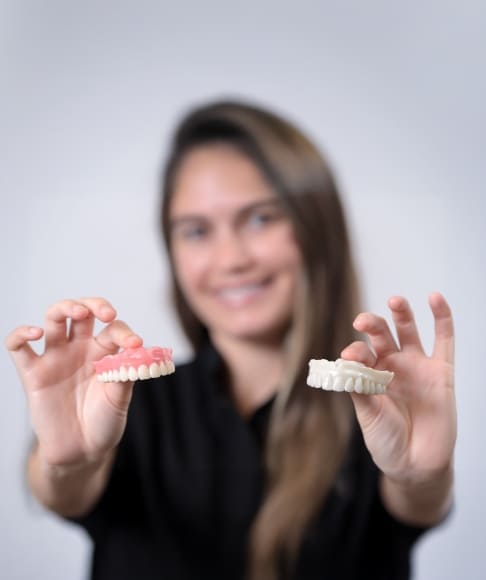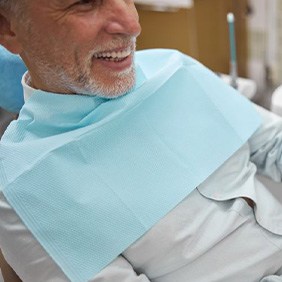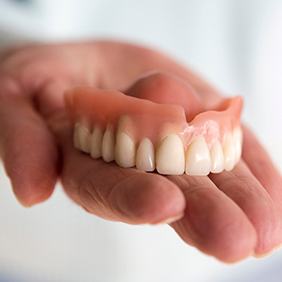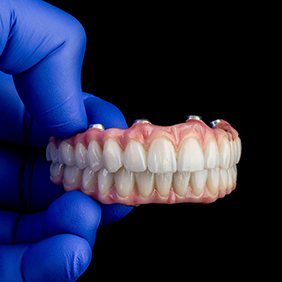Dentures – Vero Beach, FL
Regain a Complete, Confident Smile
Are you missing most or all your teeth? If so, you’re not alone. According to the American College of Prosthodontists, about 178 million Americans are missing at least one permanent tooth, while around 40 million Americans have no natural teeth left at all. Tooth loss can make it more difficult to eat a healthy diet, speak clearly, and feel good about your appearance. At Ocean Oaks Dental Group of Vero Beach, we can help you regain a complete, confident smile with custom-made dentures in Vero Beach! These beautiful and durable restorations can help you live life to the fullest, so give us a call today to schedule your consultation!
Why Choose Ocean Oaks Dental Group of Vero Beach For Dentures?
- Team of Experienced & Friendly Dentists
- High-Quality Materials for Lifelike, Durable Results
- 3D Printed Dentures Ready in Less Than a Week
3D Printed Dentures

Thanks to our state-of-the-art in-house dental lab and 3D printer, we can typically create a custom denture in less than a week. Other practices usually require multiple weeks to do this! We use the latest technology as well as the highest quality materials to guarantee the best look and fit possible. And, we can make any adjustments or refinements ourselves to save patients even more time.
Who Is a Good Candidate for Dentures?
The process for creating dentures has been refined and perfected over the years, and they remain one of the most popular ways to restore missing teeth. One of the biggest reasons for this is that practically any adult patient suffering from moderate to severe tooth loss can be considered a good candidate for them. When you come visit us for your consultation, we will discuss your smile goals with you and evaluate your oral health to ensure that dentures are a good choice for you.
Effects of Missing Teeth

Tooth loss can be the result of many factors, including gum disease, injuries, certain lifestyle choices, genetics, and more. Regardless of why you have an incomplete smile, your condition may cause you to suffer a number of daily inconveniences and struggles.
For example, you might find it challenging to eat a balanced diet full of foods that you enjoy. Your speech may not be as clear and confident as you wish, and you may feel self-conscious about your appearance.
Our team understands how disheartening such issues can be, so we are proud to design and create beautiful dentures that have the potential to significantly enhance your quality of life.
What Qualifies You for Dentures?

You may be a good candidate for dentures if:
- You have lost all or most of your teeth in one of your dental arches. If you have only lost one or two teeth, a different treatment option may be more suitable.
- Your jawbone and gums are healthy enough to support dentures. If they are not currently able to support a prosthetic, they may become so after some restorative care.
- You want a cost-effective way to replace your lost teeth. Traditional dentures are one of the most economical ways to address extensive tooth loss.
Alternative Tooth Replacement Options

If dentures are not quite right for you, we may recommend an alternative tooth replacement option:
- Dental bridges are multi-unit prosthetics that use crowns attached to the remaining natural teeth to support artificial teeth. Bridges tend to be sturdy, durable, and aesthetically pleasing. Their biggest disadvantage is that they require the supporting teeth (called the abutment teeth) to be modified.
- Dental implants are small prosthetic tooth roots that we surgically place beneath the gumline. They bond with the jawbone and can provide a remarkably strong base of support for crowns, bridges, and dentures. We often recommend implants as the best way to replace lost dentition due to the many benefits they offer.
Types of Dentures

Not only are dentures reliable, but they’re versatile as well. Here at Ocean Oaks Dental Group of Vero Beach, our on-side dental lab can craft a wide variety of custom dentures to help patients replace teeth anywhere in the mouth in a way that works best for them. Depending on your unique situation and preferences, we may recommend one of the following:
Partial Dentures

If you still have some healthy teeth remaining, partial dentures may be a great choice for you! Like a puzzle piece, a partial denture is designed to fit around and between your existing teeth to fill in the gaps in your smile. Small, discreet clasps around your tooth structure help hold this type of denture in place.
Full Dentures

A full denture is crafted to replace an entire arch of missing teeth. The acrylic base is made to fit snugly over your gum ridge, creating a strong natural suction that holds it securely in place. However, you’ll still be able to easily remove them for nightly soaking and cleanings.
Implant Dentures

Alternatively, partial or full dentures can be paired with dental implants for optimal stability and function. With the help of four to eight small metal posts embedded into the jawbone, implant dentures are anchored into place just like natural teeth. While this type of denture requires more time and effort, many patients agree the benefits are well-worth the investment.
The Benefits of Dentures

Every year, countless people choose to get dentures to replace their missing teeth. When you understand the many benefits they offer, their popularity becomes easy to understand! They have the potential to support your overall wellness and significantly improve your daily quality of life. Would you like to learn more about dentures and the many advantages they may be able to provide for you personally? Continue reading below.
Psychological Benefits

Physical and mental health are deeply connected. Sadly, some individuals who have experienced significant tooth loss tend to adopt a distorted view of themselves or become afraid of judgement. As a result, they may choose to withdraw from social situations and miss out on meaningful interactions with friends, family, and coworkers.
If that is true of you, dentures may be able to help. They can give you a beautiful, natural-looking smile that allows you to focus on enjoying a healthy social life. They can also help you to speak and eat with confidence, so you can attend all sorts of events without worrying about how your toothless state might affect how others perceive you.
Clearer Enunciation

Clear speech is the result of complex interactions between various structures in the human body, including the teeth. Without a full set of teeth, you might find it difficult to enunciate certain sounds.
When you first get dentures, you might develop a slight lisp. With a bit of practice, though, you should adapt to speaking with them. Ultimately, your enunciation should be better than it was before you got your prosthetic.
Improves Nutrition

Many foods are difficult to consume without teeth. You might shy away from things like veggies, fruits, and lean proteins. Instead, your diet could center on soft, highly processed foods that have little nutritional value.
Dentures can enable you to eat a wide variety of foods, including nutrient-dense options that will support your overall health. With a few simple eating techniques, there should be very few foods that remain off-limits to you!
Preserves Oral Health

If you still have some of your natural teeth, dentures may benefit you in at least two ways:
- Prevent dental drift. After tooth extractions, nearby teeth may drift out of place. There is also an increased risk of further tooth loss. Dentures can serve as placeholders that preserve the positioning and health of your teeth.
- Reduced wear and tear. Dentures can take some of the pressure of chewing and eating, meaning that they can reduce wear and tear on your natural teeth.
Expands Opportunity

Your smile is one of the first things that other people notice about you. If you have big gaps between your teeth, you might be unfairly judged when you are applying for new jobs or trying to close a sale. One study from 2019 even found a negative association between being employed and poor oral health. Dentures can fill in your smile and make you look younger, healthier, and more successful overall. They will not write your resume for you, but they could give you an extra edge as you strive to advance your career!
Dentures Aftercare

While dentures can help restore the appearance and function of your complete smile, it doesn’t mean you should forego regular checkups with your dentist. Not only can they thoroughly clean your mouth and restorations, but they’ll also help monitor your oral health to ensure there are no developing issues down the road. They can even provide you with detailed instructions on how to preserve your new pearly whites for as long as possible. Here are several measures you can take for denture maintenance in Vero Beach.
Removable Dentures

Remove After Eating
Whenever you’re done enjoying a meal, be sure to take your dentures out and rinse them. This can help keep them clean as well as avoid accumulating debris, food particles, and harmful bacteria that can get stuck in any crevices. The last thing you’d want is for a buildup of plaque to form on or underneath your dentures. Avoid using hot water, as this can cause your restorations to warp and not fit in your mouth anymore.
Clean Your Restoration
Remove your dentures before cleaning them to best access both your artificial teeth and the denture base that rests on your gums. Be sure to use a soft-bristled toothbrush to clean them with a minimal amount of mild dish soap, unscented hand soap, or denture cleanser. Don’t clean with normal toothpaste, as your restorations are not made to withstand abrasive agents. Before putting your dentures back in your mouth, make sure to thoroughly rinse them so that you don’t ingest any cleaning agents.
Keep Your Dentures Safe
When cleaning and rinsing your dentures, try placing a towel underneath to prevent breakage in case you accidentally drop them. If you’ve finished and aren’t going to put them back in, place them somewhere safe and out of reach from pets or small children. You can soak them in lukewarm water or denture cleanser to keep them bacteria-free.
Remove Dentures When You Sleep
Take your dentures out before going to sleep. This will allow your gums to have a break from your restorations as well as receive essential nutrients to remain strong and healthy. Sleeping with your dentures in can end up increasing your risk of pneumonia and gum/tongue plaque. Again, try soaking them overnight in denture solution to keep them clean and fresh.
Notice Changes
If you notice any significant changes in the appearance, fit, or function of your dentures, be sure to notify your dentist. This may include mouth sores, gum irritation, and signs of infection. Avoid trying to repair your dentures with household items, as this can cause further damage. Instead, call your dentist so they can decide if your restorations need to be readjusted or replaced.
All-on-4 Dentures

Since these dentures don’t need to be removed, you can simply clean them by brushing twice a day with a soft-bristled (manual or electric) toothbrush like you would for natural teeth. However, don’t use abrasive or stain-removing toothpaste, as this can ruin the texture of the denture material. Floss your restorations daily with either dental floss or a water flosser. You may also consider using floss threaders to reach underneath your dentures. Rinse your mouth often with an antibacterial mouthwash to keep plaque and tartar at bay.
Dentures FAQs
Can I sleep with my dentures?
The only time you should expect to sleep with your dentures is the first night you receive them. After the initial 24 hours of wear, our team at Ocean Oaks Dental Group of Vero Beach strongly advises that you remove them before going to bed. The reason is that much pressure is placed on your jawbone and gums throughout the day. When taking out your dentures in Vero Beach and allowing them to soak at night, you give these areas of your mouth a chance to breathe.
Valuable nutrients are restored while you are asleep, and the chances of ridge resorption slow significantly. If you choose to instead leave your dentures in, you run the risk of gum irritation and pneumonia – an unfortunate problem that can occur when bacteria are allowed to accumulate in moist, dark environments.
Can dentures reduce life expectancy?
When you lack a strong bite force, you will find that you’re unable to eat nutrient-rich foods that are beneficial to your overall health and well-being. This can lead to malnutrition and other similar issues that affect more than just your mouth. Your heart, brain, and other parts of the body can begin to show decline. This is just one of the many reasons patients opt for dental implants, as they can restore significant bite force, allowing you to eat the foods you love.
What is the average age for dentures?
Tooth loss doesn’t discriminate based on age. However, it’s no surprise that a majority of people wearing these custom prosthetics tend to be much older.
The National Center for Health Statistics reports that an estimated 66% of individuals between the ages of 40 and 64 are living with at least one missing tooth. Approximately 57% of people between the ages of 65 and 74 wear dentures, according to the American Dental Association. The reason for tooth loss in later years can be attributed to everything from lifestyle habits, poor oral hygiene, and even health-related conditions that are commonly linked to tooth loss (i.e., heart disease, diabetes, osteoporosis).
Although the statistics show that more mature adults are wearing dentures, the truth is that these artificial teeth can be crafted for virtually anyone who lacks a complete smile.
What can’t you eat with dentures?
While you may enjoy the look of your new dentures, you’ll need to be mindful when it comes to eating certain foods. These include:
- Sticky foods that can pull your dentures out of place, such as caramel or peanut butter.
- Hard foods that can potentially damage your teeth should you accidentally bite down too hard. Corn on the cob, apples, nuts, and popcorn are all examples of hard foods you should limit or avoid.
- Dense, tough meats that require you to pull with your teeth and ultimately place excessive pressure on your gums. A common example is steak.
